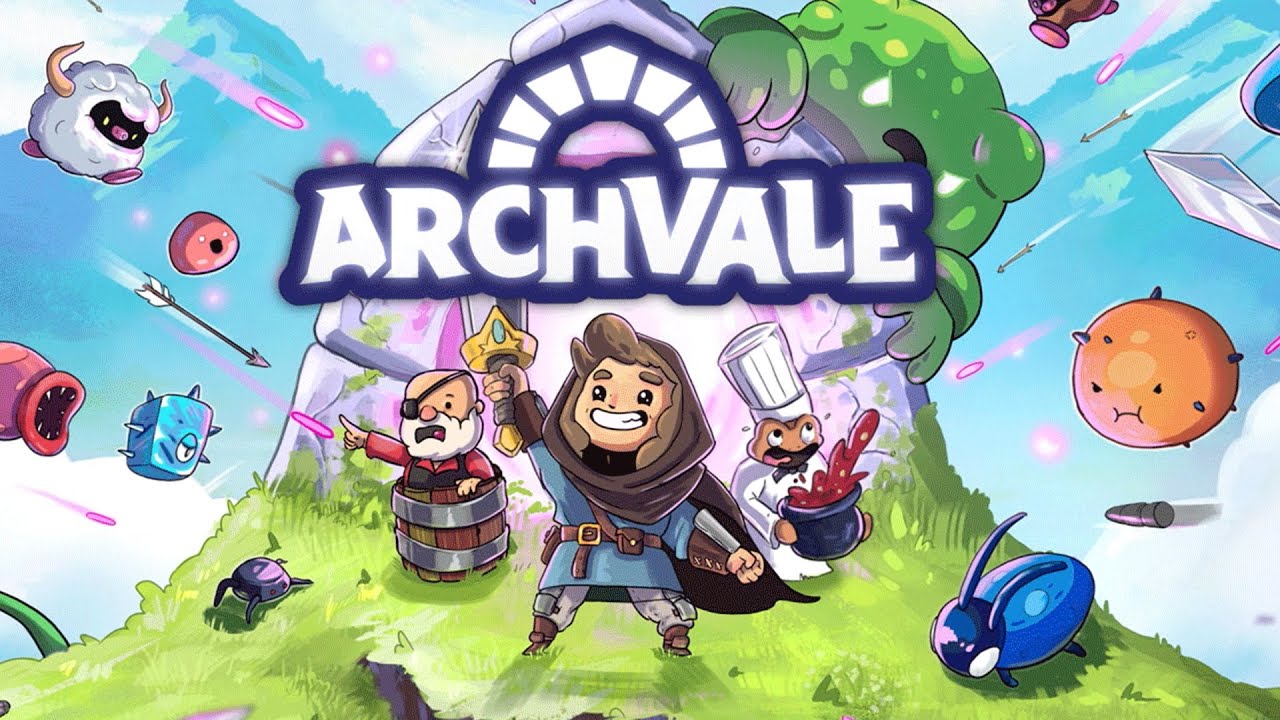On the surface, Archvale is a bullet hell shooter with a fantasy setting. However, after playing for a few minutes you’ll quickly realise that it’s far more than a twist on just one genre. This game pulls inspiration and mechanics from several genres, blending them together to form something that’s almost incredible.

The main story in Archvale is forgettable, but serves its purpose in giving you a reason to continue playing. There are a number of Archstones scattered across the lands that have been overrun by the Undying. It’s your task to track them down and take them back from the colossal creatures that guard them within dungeon ruins. While that’s all you need to know, there are smaller stories the game tells throughout its runtime.
For example, there’s the NPC in an early town who speaks about a crab-infested cave nearby. Inside that cave you’ll find a crab man: a sentient crab just walking around, handing out weapons and advice. There’s a sea monster in need of a meal who will give you a ride in exchange, a greedy merchant who wants as much treasure out of you as possible, and an eccentric chef who’s obsessed with plums. The characters add far more to the game’s world than the story itself does, and I think that’s a testament to how well-realised the vision behind the game is.

It’s hard to nail down what to expect when you play Archvale, but the main elements you’ll see are from bullet hell shooters. Enemies fill the screen with projectiles, and your weapons do the same. Even swords send a slash out a short distance. You must weave between enemy bullets and deal damage while preserving your own fragile health. The game’s world is made up of rooms and sections of land that are arranged on a large map spanning many biomes. The world map is designed well enough that it feels like you’re exploring a true fantasy continent.
The core gameplay revolves around beating a series of rooms until you locate a dungeon. These areas have their own small maps to conquer, as well as puzzles with keys and top-down platforming that wouldn’t feel out of place in a Legend of Zelda game. You then confront the boss, kill it, and claim a new item, a permanent upgrade such as a bomb, and a heart container. Any Nintendo fan will spot the inspiration from one of the company’s flagship franchises instantly, but it works in Archvale’s favour. Every boss has unique mechanics that make the fight against them feel like the crescendo to a biome before moving on to the next, slightly stronger than before.
Enemies are incredibly varied, and there’s some level of randomisation in each room (or at least it feels like there is), so that you’re always facing an interesting combination of what that biome has to offer. While runs to tough rooms or bosses can become tedious, it plays into the other inspiration so present in the game. So many Soulslike aspects have been pulled into Archvale, including fountains that replenish health and reset every room upon activation. You can even teleport to other fountains, which mercifully shrink the map somewhat to avoid bullet hell exhaustion.

With a world so vast, you’re never stuck for something to do in Archvale. Should you find yourself struggling to beat a boss over and over again, you can explore another path you skipped earlier instead. At times it feels unclear which biomes you’re meant to progress through first, and I think that’s deliberate. After having my ass handed to me in one biome for a while though, I often found that I could now progress down a path I found too challenging earlier in my playthrough, a cycle that repeated itself for the rest of the story.
You increase the strength and capabilities of your character by defeating bosses, activating fountains, and crafting. Every biome is filled with enemies and deposits that drop resources. Collect enough, and you can craft some new armour that might increase your stats. You’ll also find new weapons naturally as you progress, and get a feel for which you prefer to use. Enhancing weapons helps you push a build once you’re comfortable.
However, there are some points in the game when it becomes necessary to switch things up, regardless of how powerful your weapon is. Some biomes have specific weapons that will help you decimate the local population better than anything else, but that’s not always the case. A nice idea if it had been fleshed out more. Finally, there are also bullet hell shrines where you can experience combat-free bullet hell dodging gameplay. These offer powerful rewards, but they’re incredibly tough to beat, requiring almost zen-like concentration.

Archvale looks simple but hides complex enjoyable gameplay. It has deep systems to master that should satisfy any RPG, soulslike, or bullet hell fan for a good number of hours. However, it falls short of perfect when these ideas don’t go far enough. It’s almost essential, and certainly respects the time you give it.
Archvale £34.80
Summary
Archvale is an engrossing title that you never really stop thinking about. It’s got everything a soulslike or Zelda fan could need, but twists the gameplay just enough to keep it feeling fresh, even when you’re grinding out levels to take on a boss.

